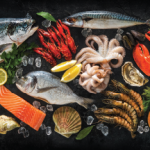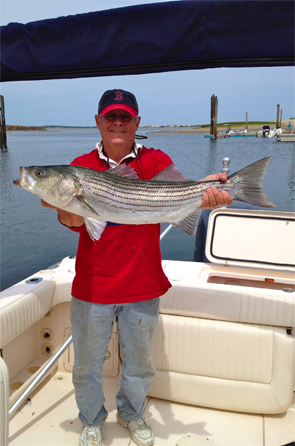
Dr. Coblyn catching striped bass and bluefin tuna in Cape Cod Bay.
Jonathan Coblyn, MD, was around 10 years old the first time his father took him fishing in April to Great South Bay, the largest shallow saltwater bay in New York. It was so cold that he remembers scraping frost off the lines that tied the family’s 26-foot motorboat to the pier.
Dr. Coblyn, clinical chief of rheumatology at Brigham and Women’s Hospital in Boston, grew up in Long Island and spent a great deal of time on that motorboat during his childhood years. He smiles every time he reminisces about those adventures of vacationing with his family and fishing with his father, mother and brother. Yet it wasn’t until his late 50s before he returned to the sea, catching and then releasing fish. He doesn’t much care for fancy fishing rods, tackle or gear, or even specialized activities like fly fishing. The simpler, the better, he says.
Perhaps nothing relaxes and excites him more than sitting on his own fishing boat, admiring the scenery and embracing the sun’s warmth while eagerly awaiting that first tug on his fishing line.
Horses to Whales
Dr. Coblyn graduated from The Johns Hopkins University School of Medicine in Baltimore in 1974. During the next two years, he pursued his internship and residency at Brigham and Women’s Hospital in Boston and spent the following year finishing his senior medical residency at Stanford University Hospital in Palo Alto, Calif., becoming certified in internal medicine. His fellowship in rheumatology was completed between 1977 and 1979 at the former Robert Breck Brigham Hospital, now part of Brigham and Women’s Hospital. He’s been working at this facility ever since.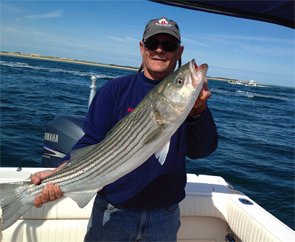
Dr. Coblyn’s family—his wife, Amy, their four children and several horses—lived in an 1820’s restored farmhouse in Sherborn, just west of Boston. Ironically, Amy didn’t really care for the ocean and firmly planted her feet on dry land.
Just as well. Between the kids, horses, farmhouse and his work, Dr. Coblyn had his hands full. But after his children grew up, his thoughts wandered off to the sea, lured by childhood memories of fishing with his father. Could he convince Amy to try fishing?
There was only one way to find out. He purchased a Grady-White 20-foot power boat and docked it in Barnstable Harbor on Cape Cod Bay. Well, the fish weren’t the only ones hooked. Although the entire family enjoyed it, his daughter, Kimberly, was the most enthusiastic of the bunch. Dr. Coblyn occasionally brags about her fishing prowess (possibly genetic?) and treasures a recent photo of her catching a striped bass on a friend’s fishing boat.
Since his children now have careers and families of their own, Amy accompanies Dr. Coblyn on each fishing trip. “I won’t go myself,” he says, adding that he fishes only during warm weather, from roughly mid-May to early October. “I’m too chicken, and Amy prefers to be able to see land from the boat at all times.”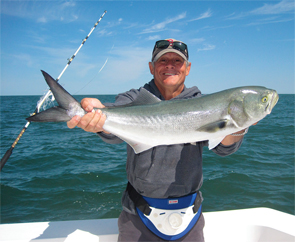
Still, the couple have a few fishing tales to tell of their own. One time, while fishing in Cape Cod Bay on Columbus Day, black clouds suddenly filled the sky. He immediately turned the boat around and headed back to the pier, pummeled by sleet and hail. “That’s the last time we will ever go fishing so late in the year,” he says.
Last Mother’s Day, he read in the local paper that right whales were in Cape Cod Bay. As the rarest of all large whales, they are typically recognized by their enormous heads and jaws that accommodate hundreds of baleen bristles or teeth.
Dr. Coblyn and his wife headed out to Cape Cod Bay that Sunday, surprised to be the only boat in sight.
“We went out 10 miles, which I almost never do,” he says. “I’m usually a wimpy fisherman. I want to see land. I was about to turn around when my wife said, ‘Look over there.’ There were three right whales 100 yards from us … swimming around, frolicking. That was one of the most amazing experiences I’ve ever had on the boat.”
Common Bond
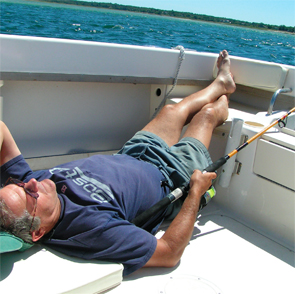
Dr. Coblyn catching rays on his 20-foot speed boat.
Dr. Coblyn believes fishing and rheumatology share a common evolution. In the old days, he says rheumatologists would spend much time trying old-fashioned remedies like liquid gold shots. It would take a long time to finally hit “a winner,” he says. Fishing is the same way. You can spend many hours—even days—fishing and not catch a single fish, big or small.
But many things have changed since then. Now rheumatology drugs act fast. Physical pain experienced by patients can be quickly relieved. Likewise, people who fish can cheat a little by using technology that finds fish. No more anguish. No more frustration. No more defeat.
Although he never claims to be an expert fisherman, he is willing to share a valuable secret he learned long ago. When coming back from a fishing trip empty-handed, just say the fish weren’t biting, because it was too cold, too hot, too windy or the tide was too high low or too high. “You’ll sound like you know what you’re doing,” he jokingly says.
However, there’s nothing funny about how fishing has enhanced his life.
“It’s being away and an escape to enjoy the beauty of the water, sky and peaceful surroundings with my wife,” he says. “To me, that’s the ultimate.”
Listen to Dr. Coblyn discuss more about fishing and rheumatology.
Carol Patton is a freelance writer based in Las Vegas.

